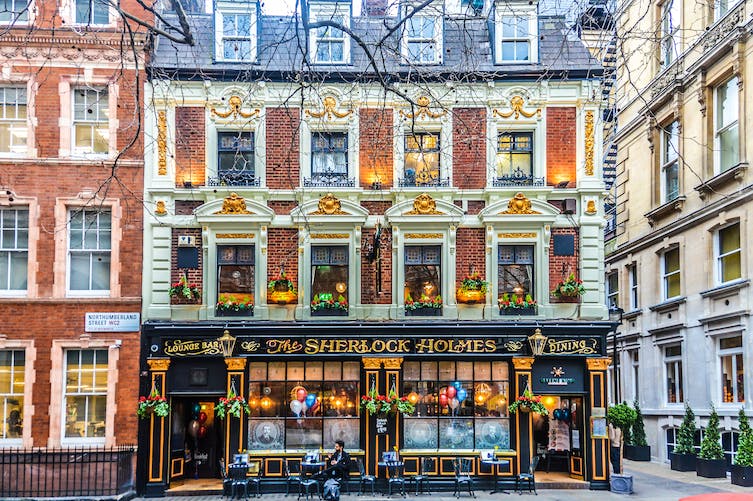Good beer in good company. What could be better? But, as delightful and simple as that scenario is, it’s phenomenally easy to bugger up a good pub. There’s less agreement, however, about what the perfect pub should look like. Back in 1946, George Orwell set out in his classic article, The Moon Under Water, 10 essential features of his ideal pub: since he knew of nowhere that satisfied all of them, his Moon Under Water had to be a wonderful fiction. Some 70 years down the line, many pubs in search of perfection are fiddling with minute details or pointless frippery. For me, once the basics are sorted, it’s all a case of what not to do. So here are my 10 simple commandments to keep the perfect pub perfect.
1. Don’t be pretentious. If you serve good beer, well done. But let’s spare the round of mutual high-fives: this is a duty, not a virtue. As to other drinks, the simpler the better: I don’t want a tiny ‘craft’ beer in a can, I don’t want a cocktail that takes 10 minutes to make, and I don’t want a first-growth claret (well, I do, but not here).
2. Don’t serve food that takes more than six words to describe. ‘Sausage and mash’ good, ‘Steak and chips’ fine, ‘Cornish lamb cutlets, pulled Lamb croquettes, spring greens and hazelnuts in a juniper & port jus’, no. If you do want to go full-on in the food stakes, feel free to put your focaccia on some slate, your chips in a baby bucket, and your condiments in a reclaimed watering can. But you have now mutated into a ‘gastropub’. (It’s worth noting, by the way, that the lexicographers would call this grotesque portmanteau – public stomach – a ‘nonce word’.)
3. Don’t change your name. For many pubs the most interesting thing actually is their name – think of Jack Straw’s Castle (London), The Drunken Duck (Ambleside), The Bucket of Blood (Phillack), or Dr Syntax (Prudhoe). A new landlord is a new custodian of a community’s heritage, not a marketing sleaze. Worst of all is the vogue of rebranding a pub under the nickname the locals use: a pub sign announcing ‘The George’ or ‘The Duke’ is pathetic.
4. Don’t pipe music. The very last thing a pub needs is muzak, the siren-call of a place where drinkers don’t want to talk to each other or think alone. Any radio should be a no-go, except perhaps for Test Match Special. If you must have a jukebox, there is a by-law: no compilation albums. (Live music, of course, is a very different kettle of fish, and the gig pub is a fine institution.)

No compilation albums allowed (Chris Ware/Getty Images)
5. Don’t offer tasters of beer. This business of try-before-you-buy has gone too far if it’s reached the pub bar. OK, inspect a small glass jar of the beer like a medicinal specimen if you must, but commit to a pint – or a risk-averse half. This is not the place to sip, sniff, swill and refuse.
6. Don’t fill the room with those bizarre high chairs. Having stools at the bar is one thing, but to fill the rest of the pub with towering chairs that leave your legs dangling like a schoolboy in the headmaster’s office is simply not on. Many landlords, especially those in cities, have convinced themselves that they must cater for the potential arrival of a Brobdingnagian stag party. Why?
7. Don’t fetishise the handled glass and its quaint dimples. It’s neither new technology or a true reflection of tradition. Your simple and straight pint glass doesn’t feel any need to glance at itself in the mirror.
8. Don’t allow tables to be reserved. The pub should be a free-for-all, of shoulders rubbing with shoulders as patrons come and go. If ‘Suzi’ or ‘Xander’ has chosen to arrive with five acolytes at 7.30pm, who is to stop them? But the idea that they can oust others from their pre-appointed ‘area’ is perverse.
9. Don’t upgrade your toilets. The gents in a pub is a strange, almost sacred space (I draw a blank on the ladies). It should achieve only the simplest of objectives. If it’s an Edwardian masterpiece of civic pride, all to the good. But if it’s a wall of sheet metal, it’s still a keeper. Leave it – and its eye-opening chalkboard – be. If you want to spend some money on the pub, fix the bar billiards table, triple the quiz night kitty, or build a bespoke Aunt Sally venue.
10. Don’t plaster the walls with TVs. The last thing the pub-goer needs is a mural of rolling news. Yes, turn the TV on for sports of national significance, and perhaps the odd coronation, but spare your drinkers a visual bombardment. (I can forgive the dedicated sports pub, where TVs are part of their raison d’etre.)
Of our 50,000 pubs in the UK, every now and then I stumble across one that satisfies these rules with ease. But with 20 pubs closing each week, and new ventures finding it impossible (and illegal?) to take the minimalist approach, that search is becoming harder.
This all matters: the relentless closure of post offices, the steady diminution of church congregations, and the gradual disappearance of village halls make the pub the true social hub of the community. But as well as bringing people together, the pub should be an escape, abetted by alcohol, from present-day bothers. Part of that escape is secured by drink, part by the solace of the past. One final rule, then: a pub that looks to the future is a pub that has lost its way. With this I hope George would agree.






Comments